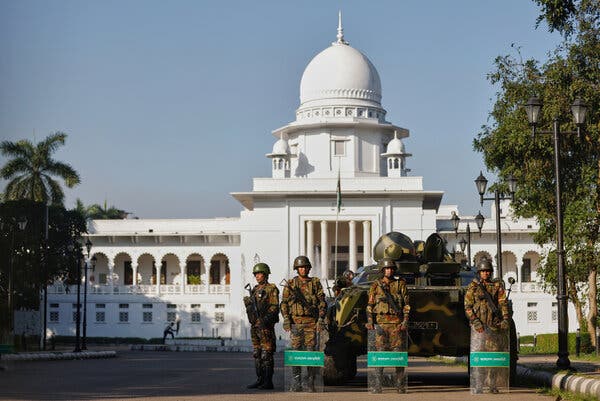World
Bangladesh Tribunal Sentences Former PM Sheikh Hasina to Death

A tribunal in Bangladesh has sentenced former Prime Minister Sheikh Hasina to death, convicting her of crimes against humanity, including murder and the use of lethal force against protesters. This ruling, issued on March 25, 2024, marks a significant moment in the country’s political landscape, as it addresses the violent events surrounding the student uprising that led to her ousting last year.
The trial was conducted in absentia, as Hasina has been living in exile since the protests that escalated in August 2024. The demonstrations, which began as peaceful protests, devolved into violent clashes between security forces and civilians. Reports indicate that hundreds of civilians lost their lives during this period, prompting widespread calls for accountability from the interim government.
Following the protests, Sheikh Hasina fled to India, where she remains. She has consistently denied any involvement in the alleged atrocities and has criticized the tribunal’s proceedings. The International Crimes Tribunal, which issued the verdict, is a specialized court in Bangladesh established to prosecute serious crimes, and its ruling is seen as a commitment to justice.
The sentencing is significant not only because it holds a former leader accountable but also because it fulfills a promise made by the interim government led by Muhammad Yunus, the 85-year-old Nobel laureate. Yunus was appointed to restore stability in Bangladesh following the turmoil of what is now referred to as the “July Revolution.” His administration has emphasized the importance of moving towards a stable electoral democracy with free and fair elections.
Legal experts suggest that it is unlikely India will extradite Hasina, considering her status as a close ally. The implications of this ruling may resonate beyond Bangladesh, influencing discussions on governance and human rights in the region.
As the situation develops, observers are closely monitoring reactions from both the Bangladeshi government and international community. The verdict represents a pivotal chapter in Bangladesh’s ongoing struggle for accountability and justice in the wake of political violence. Further updates are expected as this story unfolds.
-

 Science4 weeks ago
Science4 weeks agoInventor Achieves Breakthrough with 2 Billion FPS Laser Video
-

 Health1 month ago
Health1 month agoCommunity Unites for 7th Annual Into the Light Walk for Mental Health
-

 Top Stories1 month ago
Top Stories1 month agoCharlie Sheen’s New Romance: ‘Glowing’ with Younger Partner
-

 Entertainment1 month ago
Entertainment1 month agoDua Lipa Aces GCSE Spanish, Sparks Super Bowl Buzz with Fans
-

 Entertainment1 month ago
Entertainment1 month agoMother Fights to Reunite with Children After Kidnapping in New Drama
-

 Business1 month ago
Business1 month agoTyler Technologies Set to Reveal Q3 Earnings on October 22
-

 World1 month ago
World1 month agoR&B Icon D’Angelo Dies at 51, Leaving Lasting Legacy
-

 Health1 month ago
Health1 month agoCurium Group, PeptiDream, and PDRadiopharma Launch Key Cancer Trial
-

 Entertainment1 month ago
Entertainment1 month agoRed Sox’s Bregman to Become Free Agent; Tigers Commit to Skubal
-

 Health1 month ago
Health1 month agoNorth Carolina’s Biotech Boom: Billions in New Investments
-

 Science1 month ago
Science1 month agoNorth Carolina’s Biotech Boom: Billions Invested in Manufacturing
-

 Top Stories1 month ago
Top Stories1 month agoFormer Mozilla CMO Launches AI-Driven Cannabis Cocktail Brand Fast









